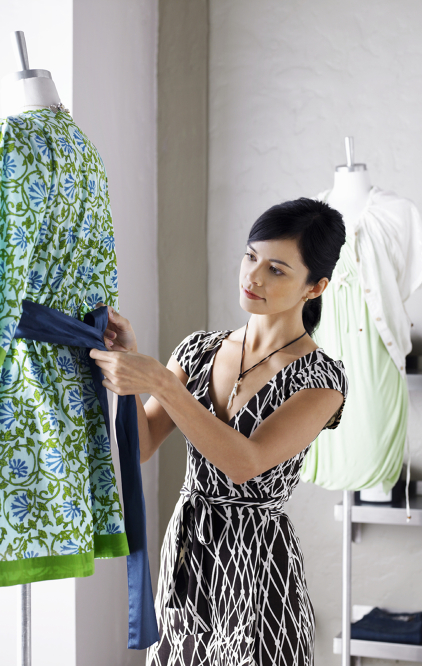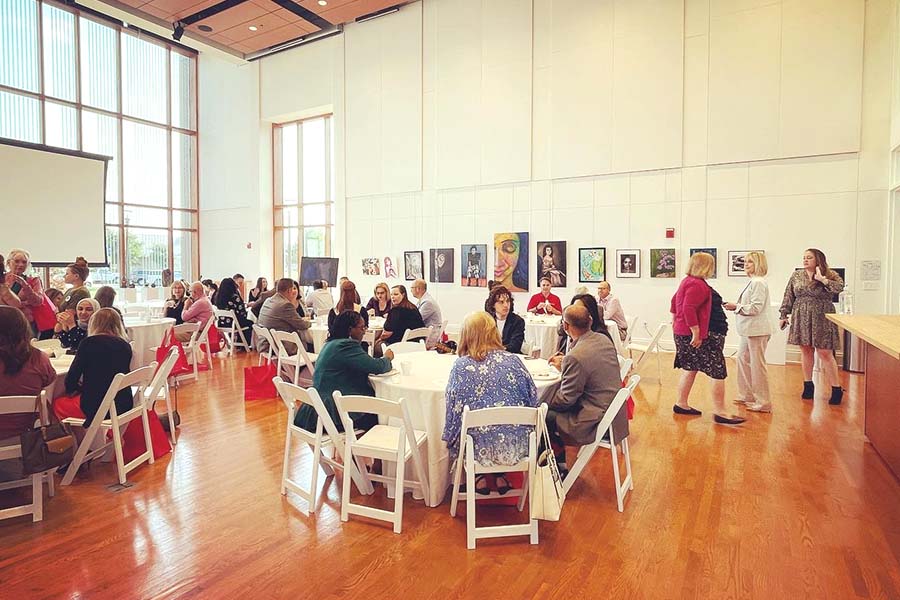Fashion at a Glance
4-18 months to complete1
$1,782-$3,267 tuition2
- El Centro3
2 years to complete1
$5,940 tuition2
- El Centro3
What Can I Study?
I Want to Go to Work
Dallas College offers fast, flexible credentials designed with local employers to help you quickly start or advance your career.
-
Credit Certificates
- Alteration Specialist Certificate $2,871 18 months
- Fashion Design Certificate $3,168 1 year
- Visual Presentation Specialist Certificate $1,782 4 months
- Wholesale and Manufacturing Sales Representative Certificate $3,267 8 months
-
Associate Degrees
- Apparel Design A.A.S. $5,940 2 years
- Fashion Marketing A.A.S. $5,940 2 years
- Technical Pattern Design A.A.S. $5,940 2 years
Can I Get a Job?
Dallas College offers a variety of certificates and degrees to help you gain the skills you need to start working right away.
- These credentials are often considered Career and Technical Education (CTE).
- These credentials are established with the assistance and cooperation of representatives from local business, to meet local and regional employment needs.
- Higher level certificates and degrees will typically lead to a higher salary in the workforce.
- Workforce (CE) Certificates can often be completed faster than traditional credit certificates but typically do not offer college credit.
- Level 1, Level 2, Enhanced Skills certificates and others, offer college credit and are often stackable to help you build skills as you work towards an Associate Degree.
- Workforce credentials may give you college credit at Dallas College, but they may not transfer to other colleges or universities.
If you're unsure if this is the right path for you, you can talk to a Pathway Specialist for advice.
Pathway Specialist
- PathwaySuccess@DallasCollege.edu
- 972-669-6400
What Can I Earn? Will There Be Plenty of Jobs?
Creative flair plus an understanding of garment production and business will make you a stand-out job candidate in the fashion industry. Check out a few of the incredible career opportunities you’ll be ready for. Your future starts here!

Fabric and Apparel Patternmakers
$17/hr
Median Salary
9
Job Openings
+5%
Projected Outlook
Top Skills:
- Critical Thinking
- Active Listening
- Time Management
- Judgment and Decision Making
- Reading Comprehension
- Monitoring
- Quality Control Analysis
- Mathematics
- Speaking
- Active Learning

Fashion Designers
$42/hr
Median Salary
99
Job Openings
+15%
Projected Outlook
Top Skills:
- Critical Thinking
- Active Listening
- Speaking
- Time Management
- Coordination
- Social Perceptiveness
- Judgment and Decision Making
- Active Learning
- Reading Comprehension
- Persuasion

Stockers and Order Fillers
$17/hr
Median Salary
16907
Job Openings
+14%
Projected Outlook
Top Skills:
- Active Listening
- Reading Comprehension
- Speaking
- Social Perceptiveness
- Monitoring
- Service Orientation
- Coordination
- Critical Thinking
- Time Management
- Judgment and Decision Making

Wholesale and Retail Buyers
$37/hr
Median Salary
1569
Job Openings
+16%
Projected Outlook
Top Skills:
- Negotiation
- Persuasion
- Critical Thinking
- Active Listening
- Speaking
- Active Learning
- Judgment and Decision Making
- Reading Comprehension
- Social Perceptiveness
- Management of Financial Resources
All jobs data gathered for Dallas/Fort Worth. Source: Dallas College Labor Market Intelligence and Lightcast4.
“There are three key disciplines to fashion design: sewing, patternmaking and design, all of which El Centro efficiently planned and taught during my years there. I always knew I had the talent and desire, but El Centro gave me the tools and confidence to succeed.” Read Suzanne Holmes-Myler's story.

Find Out More About Fashion
Sign up to receive additional information about Fashion or call 972-669-6400.
School of Creative Arts, Entertainment and Design
- 972-860-8912
- PathwaySuccess@DallasCollege.edu
Dallas College
- 972-669-6400
- Text College to 214-978-6457
- StudentHelp@DallasCollege.edu
1Length of time is based on catalog degree plans. Prerequisites may be required, which are not included in this estimate. For most programs, full-time student status is assumed, a minimum of 12 credit hours per semester.
2Cost is based on tuition rates for program hours for Dallas County residents. The price of most required learning materials (books, software, supplies, etc.) is included with the price of tuition. Visit our Paying for College site to learn more about cost, financial aid, scholarships and more.
3Each location offers a unique combination of certificate and degree options. Not all degree and certificate offerings are available for admission/start at all campuses every semester.
4A portion of Lightcast’s data comes from O*NET Online by the U.S. Department of Labor, Employment and Training Administration (USDOL/ETA). Used under the CC BY 4.0 license. O*NET® is a trademark of USDOL/ETA. Lightcast has modified all or some of this information. USDOL/ETA has not approved, endorsed, or tested these modifications.





